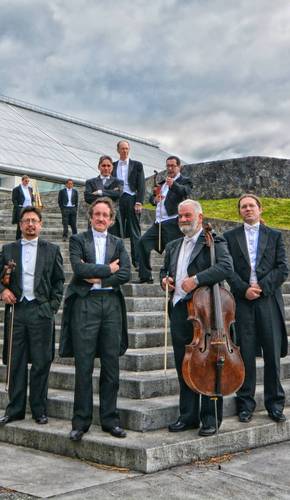The Xalapa Symphony Orchestra (OSX) of the Universidad Veracruzana (UV) celebrated a historic episode in the consolidation of the group: the arrival of twenty Polish musicians to its ranks in the 1970s, who with their technique and repertoire They enriched the musical landscape of the Gulf of Mexico.
In interview with The Day, Andrzej Dechnik, main double bassist at OSX, acknowledges that Exchanges are always enriching in both senses. You must never close yourself off from influences, you must always be in that current. We Poles not only brought what we knew, but we also enriched ourselves with Mexican music; On our tours around the world we play Mexican repertoire so that they know it
.
The musician narrates that it was in 1974 when his compatriot Maurycy Mazuryk became the first Pole to arrive in Xalapa, Veracruz. Behind him and until 1980, violinists and double bassists from that European nation were involved in a diaspora, leaving their native country to join the OSX.
Entre ellos figuraron Ryszard Zerynger, Andrzej Zaremba, Adam Wajda, Wladislaw Halon, Janina Harasymowicz, Elzbieta Boniakowska, Alicia Jastrzebska, Andrzej Kalarus, Miroslaw Szklarczyk and Jerzy Lemiszka.
“For many years, we called Mazuryk Dr. Wallbecause when he arrived in the city, the UV was on vacation. No one came to the airport for him and he had to spend his first night leaning on a small wall in the old bus terminal. Fortunately, someone helped him and he was able to quickly integrate into the community,” says Dechnik.
Until that period, the majority of OSX members came from the United States, so when the group from Poland joined the group, it gave it a multicultural character. The instrumentalists brought with them not only their talent and technique, but also the Polish musical tradition, especially works by composers such as Frédéric Chopin, Karol Szymanowski and Krzysztof Penderecki. “In those years, the the voice of the people It said that OSX was actually Poland’s, but no, it was not true. We were only 16 or 18,” he added.
At the time of that migration, the Eastern European country was under the communist regime, and although strict control over artistic expressions still prevailed, classical music enjoyed relative freedom, with musicians traveling abroad and carrying with him the compositions of his homeland.
Meanwhile, in Mexico there was a period of consolidation and growth in several musical institutions. The UNAM National Symphony and Philharmonic orchestras saw their presence and artistic programs strengthened. In Veracruz, OSX passed from the hands of the state government to the university, while at the same time it undertook a renewal of its members.
For the OSX to be nourished by Polish talent, the friendship between its director Fernando Ávila Navarro (1969-1975) and the writer Sergio Pitol, cultural attaché at the Mexican embassy in Poland (1969 to 1972), played a central role.
▲ Members of the OSX, which this year celebrated half a century of the arrival of Polish performers, who with their technique and repertoire enriched the musical landscape of the Gulf of Mexico.Photo courtesy OSX
At that time they needed musicians, and Pitol told Ávila that in Poland there were people who could travel to Mexico and join the group. I know that Ávila traveled personally to make some hires
says Dechnik.
The performer considers that Pitol and Arias’ invitations were well received by curious young people who saw something exotic in this nation and, motivated by seeing their friends leave, accepted the proposal.
But the presence of the performers from Eastern Europe was not limited to their participation in the orchestra. From Xalapa they gave life to several groups such as Trio Varsovia and Grupo Poland. In addition, they taught classes at the UV Faculty of Music.
Dechnik considers that the main impact of that generation is related to teaching. Coming from the music academies of Krakow, Warsaw, Katowice and Wrocław, with specializations in violin and double bass, “our influence germinated in the classrooms.
He adds that although as time went by, the members of that group retired, very few returned to their country of origin. Today we can see the fruits of their work: Mexico no longer needs to bring in instrumentalists, now there are many capable, talented young people.
.
Currently, graduates of the UV Faculty of Music are integrated into orchestral groups in various European countries, such as the Radio Symphony in Denmark and those of Vienna and Salzburg in Austria.
To honor this episode that transformed its identity, the OSX offered a concert a few days ago with Polish works and artists. The opera’s overture was included in the repertoire. Whereas, de Stanisław Moniuszko; el Piano concerto number 1, by Chopin, and the premiere in Xalapa of the Symphony number 2 de Szymanowski.
The pianist Szymon Nehring, considered the most talented and promising of his generation, and Pavel Przytocki as guest conductor, participated in the recital. with the concert Poland in Mexico The 95th Anniversary of the founding of the group and the 80th anniversary of the UV were also commemorated.
In addition, the poster exhibition was inaugurated OSX 95th Anniversary and UV 80th Anniversary, In memoriam Wiktor Górkamade by 40 Mexican and 40 Polish artists, on the mezzanine of Tlaqná, Cultural Center.
Dechnik arrived in Mexico in 1980 to take a position in the defunct Veracruz Symphony; He then moved on to Fine Arts and then entered Xalapa in 1984.
Personally, he acknowledges, I integrated very soon: I learned to speak Spanish, I got married, I have two children from Xalapa. This country is now my homeland, I feel very good. Nobody ever treated me badly. Mexico hugged me
.
